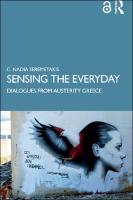Sensing the Everyday
Proposal review
Dialogues from Austerity Greece
Abstract
Sensing the Everyday is a multi-sited ethnographic inquiry based on fieldwork experiences and sharp everyday observations in the era of crisis. Blending sophisticated theoretical analyses with original ethnographic data, C. Nadia Seremetakis journeys from Greece to Vienna, Edinburgh, Albania, Ireland, and beyond. Social crisis is seen through its transnational multiplication of borders, thresholds and margins, divisions, and localities as linguistic, bodily, sensory, and performative sites of the quotidian in process. The book proposes everyday life not as a sanctuary or as a recessed zone distanced from the structural violence of the state and the market, but as a condition of im/possibility, unable to be lived as such, yet still an encapsulating habitus. There the impossibility of the quotidian is concretized as fragmentary and fragmenting material forces. Seremetakis weaves together topics as diverse as borders and bodies, history and death, the earth and the senses, language and affect, violence and public culture, the sociality of dreaming, and the spatialization of the traumatic, in a journey through antiphonic witnessing and memory. Her montage explores various ways of juxtaposing reality with the irreal and the imaginal to expose the fictioning of social reality. The book locates her approach to ethnography and the ‘native ethnographer’ in wider anthropological and philosophical debates, and proposes a dialogical interfacing of theory and practice, the translation of academic knowledge to public knowledge
Keywords
AnthropologyDOI
10.4324/9780429198182ISBN
9780429584305, 9780367187743, 9780367187767, 9780429198182Publisher
Taylor & FrancisPublisher website
https://taylorandfrancis.com/Publication date and place
2019Imprint
RoutledgeSeries
Theorizing Ethnography,Classification
Anthropology


 Download
Download Web Shop
Web Shop